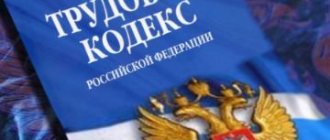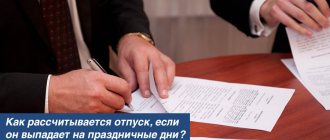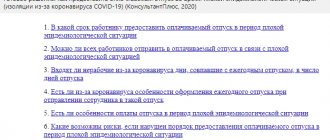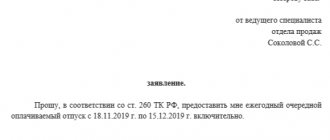How to calculate vacation pay after maternity leave?
The school director has been on maternity leave since August 15, 2015 to care for a child of up to 1.5 years. I went back to work on January 9, 2021. How to calculate vacation pay (56 days) for the next vacation from July 1? The director's salary is 65,000 rubles. per month.
Solution:
The order for granting leave to the school director is signed by the founder, vacation pay is calculated and paid from the institution’s payroll fund in the same manner as other employees.
In accordance with Art. 115 of the Labor Code of the Russian Federation, Federal Law dated December 29, 2012 N 273-FZ “On Education in the Russian Federation”, Government Decree of the Russian Federation dated May 14, 2015 N 466 “On annual basic extended paid leave”, the duration of the annual basic extended paid leave is established for the head - director of an educational organization paid leave 56 calendar days.
The validity of the employer’s right to provide leave from 07/01/2017 in the case under consideration is confirmed by Art. 122 of the Labor Code of the Russian Federation - leave for the second and subsequent years of work can be granted at any time of the working year in accordance with the order of provision of annual paid leave established by a given employer.
The average daily earnings for vacation pay and compensation for unused vacations are calculated for the last 12 calendar months by dividing the amount of accrued wages by 12 and by 29.3 - the average monthly number of calendar days (Article 139 of the Labor Code of the Russian Federation).
In our example, the last 12 months is the period from 07/01/2016 to 06/30/2017.
The specifics of determining the billing period are established by Decree of the Government of the Russian Federation of December 24, 2007 N 922 “On the specifics of the procedure for calculating average wages” (hereinafter referred to as Regulation N 922). Clause 5 of Regulation No. 922 determines that when calculating average earnings, time is excluded from the calculation period, as well as amounts accrued during this time if the employee was on parental leave (clause “e”, clause 5).
In our example, the excluded period will be from 07/01/2016 to 12/31/2016.
If one or more months of the billing period are not fully worked out or time is excluded from it in accordance with clause 5 of Regulation No. 922, the average daily earnings are calculated by dividing the amount of actually accrued wages for the billing period by the sum of the average monthly number of calendar days (29, 3), multiplied by the number of complete calendar months, and the number of calendar days in incomplete calendar months.
In our example, the calculation of average daily earnings will be made from wages for 6 months (January - June 2017) and a billing period of 6 months:
- Average daily earnings are 65,000 rubles. * 6 months / 6 months * 29.3 = 2,218.43 rubles.
- The amount of vacation pay is RUB 2,218.43. * 56 days = 124,232.08 rub.
Please note: Despite the fact that the director went to work on January 9, this month is also considered fully worked, since the days from January 1 to January 8 were non-working days (Article 112 of the Labor Code of the Russian Federation).
Additional leave for teaching staff
In addition to the annual extended paid leave, certain categories of teaching staff may be granted additional leave.
About who and on what grounds such leave is granted is in the article. Who is entitled to additional leave and in what cases? Employees of educational institutions, as well as other categories of specialists, in addition to the main leave, may be granted additional leave (Article 116 of the Labor Code of the Russian Federation).
Moreover, the total duration of annual paid leave is increased by days of additional leave. Annual additional paid leave is provided to employees: – employed in work with harmful and (or) dangerous working conditions; – having a special nature of work; – with irregular working hours; – working in the Far North and equivalent areas; - in other cases. Educational organizations, taking into account their production and financial capabilities, can independently establish additional leaves for employees. The procedure and conditions for their provision are prescribed in collective agreements or local regulations, which are adopted taking into account the opinion of the elected body of the primary trade union organization. Leave for work in special climatic conditions
In addition to the annual basic paid leave and additional paid leave provided on a general basis, specialists who work in the Far North are entitled to additional paid leave of 24 calendar days. And for persons working in areas equated to the regions of the Far North - 16 calendar days. At the same time, the total duration of annual paid leave for part-time workers is established on a general basis (Article 321 of the Labor Code of the Russian Federation).
Working with harmful and (or) dangerous working conditions
Annual additional paid leave is provided to employees engaged in work with harmful and (or) dangerous working conditions. In particular, in work related to the adverse effects on human health of harmful physical, chemical, biological and other factors (Article 117 of the Labor Code of the Russian Federation). Moreover, the duration of such leave must be at least seven calendar days (Resolution of the Government of the Russian Federation of November 20, 2008 No. 870). In relation to educational institutions, this basis for granting additional leave applies to assistant teachers in kindergartens, nurseries, preschool groups of orphanages and boarding schools that directly serve mentally retarded children, children with damage to the central nervous system with mental disorders and children tuberculosis (in educational institutions - for children with minor and subsiding forms of tuberculosis). Since these positions were introduced instead of nannies, these employees should be provided with additional leave and a reduced working day, provided for nannies of these institutions in paragraphs 55 and 14 of the “Healthcare” section of the List of industries, workshops, professions and positions with hazardous working conditions, work in which gives the right for additional leave and a shortened working day (approved by Resolution of the USSR State Committee for Labor and the Secretariat of the All-Union Central Council of Trade Unions dated October 25, 1974 No. 298/P-22). This explanation is given in the letter of the USSR Ministry of Education dated February 5, 1987 No. 9-M.
Vacation for irregular working hours
In this case, we are talking about additional annual paid leave for specialists with irregular working hours, which is provided for in Article 119 of the Labor Code of the Russian Federation.
>|Irregular working hours are a special work regime, according to which individual employees may, by order of the organization, if necessary, be occasionally involved in the performance of their labor functions beyond the established working hours (Article 101 of the Labor Code of the Russian Federation).|< It is prescribed collective agreement or internal labor regulations. Remember, such leave cannot be less than three calendar days. If the institution is budgetary, then depending on the source of its funding (federal budget, budget of a constituent entity of the Russian Federation or local budget), the procedure and conditions for providing such leave are established, respectively, by the Government of the Russian Federation, the authorities of the constituent entity of the Russian Federation or local government bodies. For example, Decree of the Government of the Russian Federation dated December 11, 2002 No. 884 approved the Rules for the provision of annual additional paid leave to employees with irregular working hours in organizations financed from the federal budget (hereinafter referred to as the Rules). In our opinion, they are applicable to other organizations.










